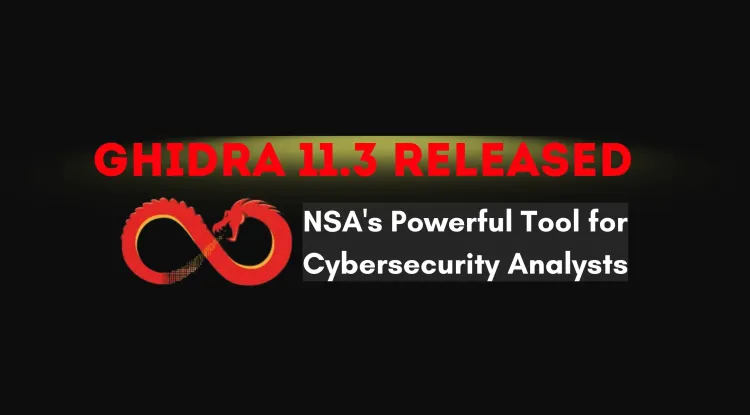Ghidra 11.3 Released—NSA’s Powerful Reverse Engineering Tool
The world of cybersecurity has gotten yet another robust boost with the unveiling of Ghidra 11.3, released by the National Security Agency (NSA). This newest version of the open-source software reverse engineering framework offers critical improvements that increase the ability of cybersecurity experts. In addition, Ghidra 11.3 Released has advanced features such as improved debugging, integration with Visual Studio Code, and sped-up emulation functionality that transform the process of malware analysis as well as vulnerability research.
What Makes Ghidra 11.3 Released a Game-Changer
The National Security Agency (NSA) has released Ghidra 11.3, the new version of its publicly released software reverse engineering (SRE) platform. In addition, the release reflects NSA’s dedication to offering the world sophisticated cybersecurity tools.
Enhanced Core Capabilities
First, Ghidra supports various processor instruction sets and executable formats, allowing users to conduct in-depth software analysis. Additionally, the framework offers comprehensive disassembly, decompilation, debugging, emulation, and scripting capabilities across Windows, macOS, and Linux platforms.
Key Features of Ghidra 11.3 Released
Advanced Debugging Capabilities
In particular, the debugger now has the ability to connect to the macOS kernel with LLDB and the Windows kernel with virtual machine-based eXDI. In turn, security researchers are able to analyze kernel-level vulnerabilities better than previously.
Just-in-Time Emulation Technology
Additionally, a new Just-in-Time (JIT) p-code emulator has been introduced for faster performance. Although not yet integrated into the UI, this feature significantly enhances scripting and plugin development capabilities.
Visual Studio Code Integration
In addition, with the ability to author module projects or script editing in Visual Studio Code, there is now a contemporary replacement for using Eclipse for development and debugging. This simplifies the workflow for development and raises the level of productivity.
Technical Requirements and Compatibility
System Prerequisites
Ghidra 11.3 requires Java Development Kit (JDK) 21 and Python 3 (versions 3.9–3.13) for debugging or source builds. Moreover, it remains backward compatible with data from earlier versions but introduces features that may not work on older releases.
Installation Process
To install Ghidra 11.3 Released successfully, follow these steps:
- Download: Access the official Ghidra GitHub repository
- Extract: Unzip the downloaded file to your preferred directory
- Launch: Execute
ghidraRun.baton Windows or./ghidraRunon macOS/Linux - PyGhidra: Run
./support/pyghidrafor Python integration
Advanced Features for Cybersecurity Professionals
String Translation and Search Capabilities
Importantly, a LibreTranslate plugin enables offline string translation, while a new feature allows users to search decompiled text across all functions in a binary. This functionality proves invaluable when analyzing internationalized malware or multilingual applications.
Enhanced Processor Support
Additionally, updates hold improved support for x86 AVX-512 instructions, ARM VFPv2 disassembly, and Golang 1.23 binaries. These updates ensure compatibility with current software architectural designs and coding languages.
PyGhidra Integration Benefits
Subsequently, the PyGhidra library, providing native CPython 3 access to the Ghidra API, is now fully integrated, enhancing scripting capabilities. This integration enables automation of complex analysis tasks and custom tool development.
How OraSec Leverages Advanced Reverse Engineering Tools
Professional cybersecurity firms like OraSec utilize advanced reverse engineering tools in their comprehensive penetration testing services. By incorporating tools similar to Ghidra 11.3 Released, security experts can identify hidden vulnerabilities and strengthen organizational defenses. Furthermore, OraSec’s expert-led approach combines manual analysis with sophisticated toolsets to uncover risks that automated scanners might miss.
Industry Impact and Applications
Malware Analysis Enhancement
Therefore, Ghidra 11.3 Released equips information security researchers to analyze advanced malware samples in an easier manner. Improved debugging functionality supports the analysis of malicious code-execution behavior at the real-time level.
Vulnerability Research Applications
Additionally, the improved processor support and emulation features facilitate comprehensive vulnerability research across diverse hardware architectures. This capability proves essential for IoT security assessments and embedded system analysis.
Educational Value
Similarly, the open-source nature of Ghidra 11.3 Released makes it an invaluable educational resource for cybersecurity students and professionals. Universities and training institutions can leverage this powerful tool without licensing constraints.
Performance Improvements and Bug Fixes
It also resolves many bugs, such as problems with the decompiler processing the recursive structure and breakpoint toggling during LLDB. In addition to that, the documentation has also been updated to Markdown format for better navigability.
Known Issues and Solutions
However, some users may encounter crashes linked to X Windows server updates. Updating to xwayland 23.2.6 or xorg-server 21.1.13 is recommended to resolve these issues.
Future Implications for Cybersecurity
The release of Ghidra 11.3 Released signifies NSA’s continued investment in open-source cybersecurity tools. Furthermore, the integration of modern development environments like Visual Studio Code demonstrates adaptability to current industry trends. Consequently, this evolution positions Ghidra as a long-term solution for reverse engineering challenges.
Conclusion
In conclusion, Ghidra 11.3 Released represents a significant advancement in open-source reverse engineering capabilities. The enhanced debugging features, Visual Studio Code integration, and improved performance make it an indispensable tool for cybersecurity professionals. Furthermore, organizations seeking comprehensive security assessments can benefit from partnering with expert firms like OraSec, which combine advanced toolsets with professional expertise. Therefore, downloading and exploring Ghidra 11.3, released today, will strengthen your cybersecurity analysis capabilities.
